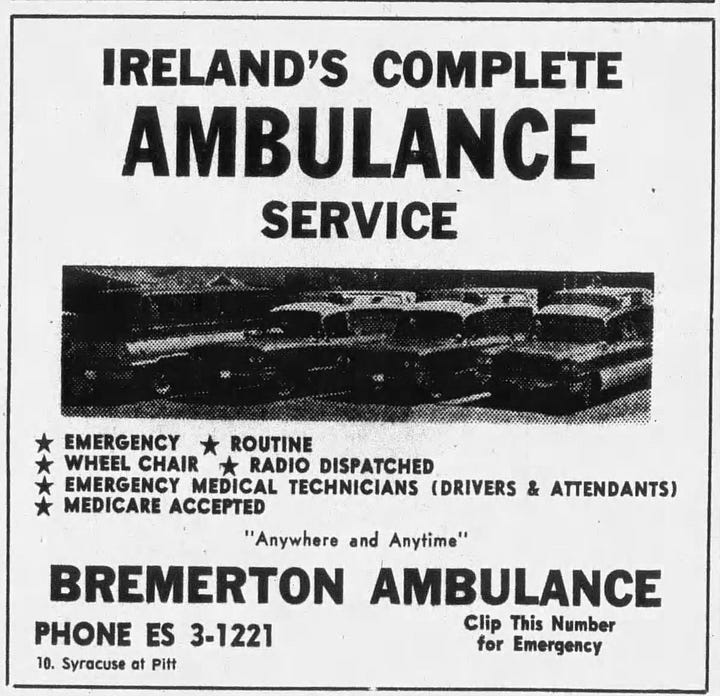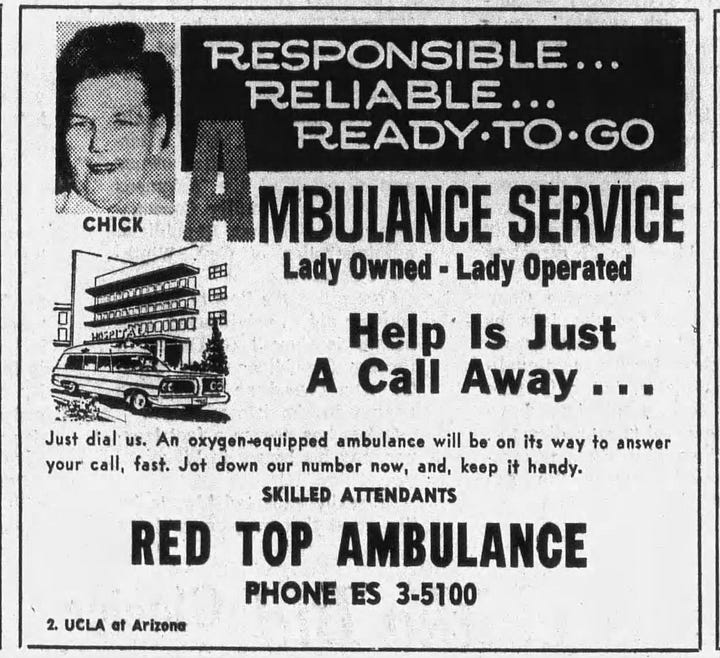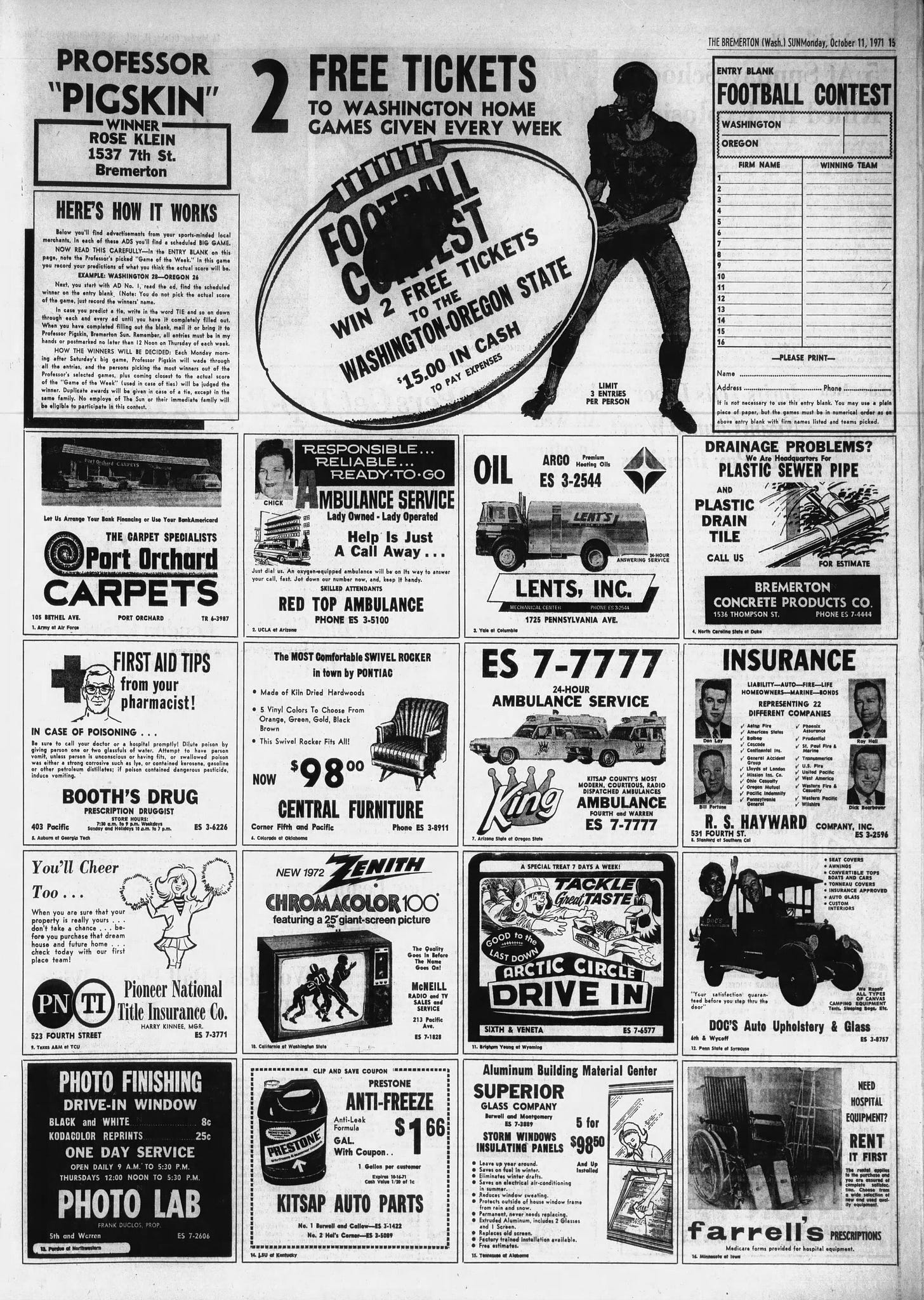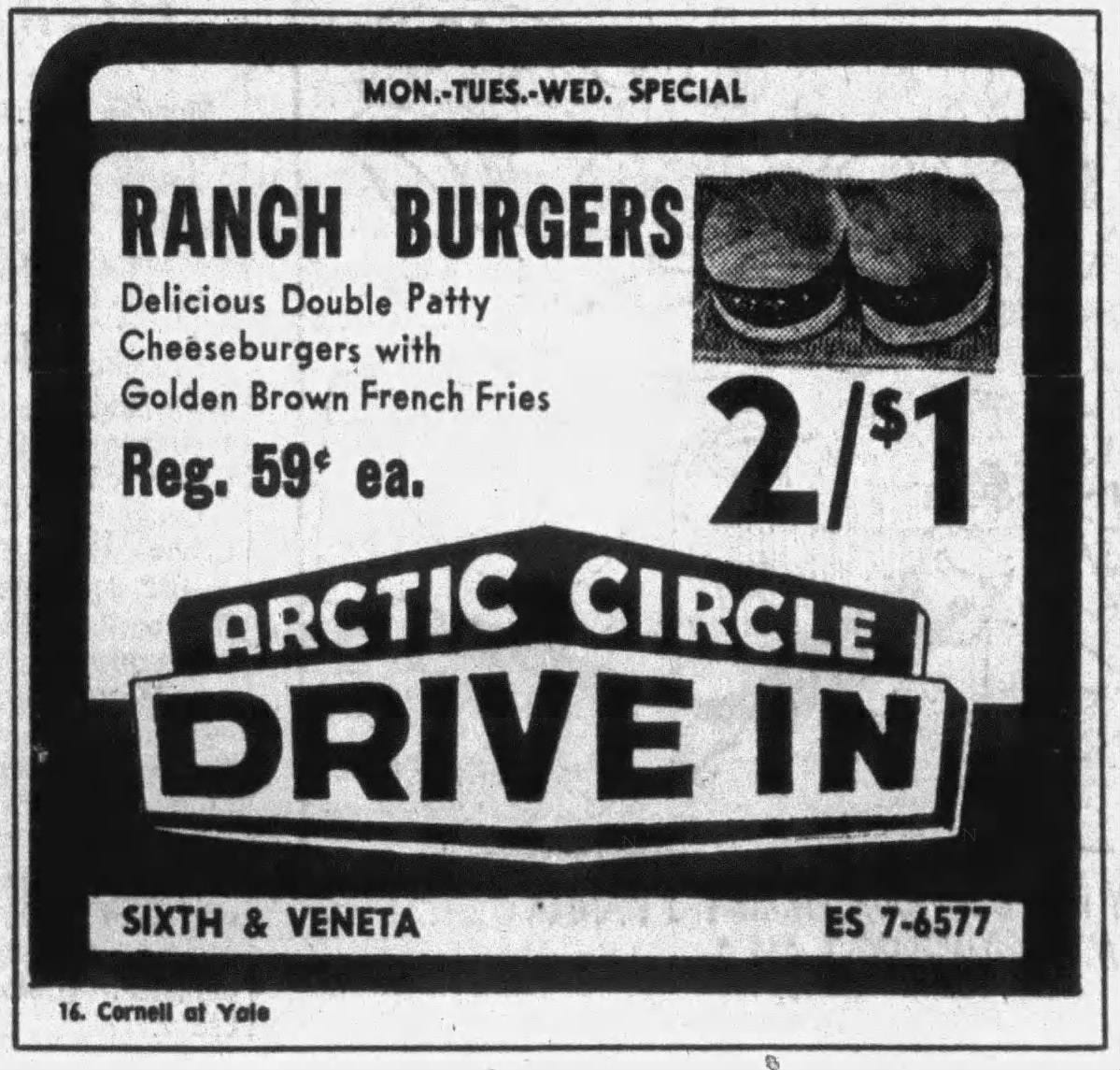Hell on Wheels
A 1971 football prediction contest sheds light on a Washington town’s ambulance and taxi drama
We’ve got part two of Colleen and Chrystal’s Dugout of History series on Billy Martin…
…and after Part 1 coincided with my journey down a rabbit hole about Idaho football’s years without a home stadium…
…there’s something interesting I found in researching that post, as I wound up reading an Associated Press story from the October 11, 1971 Bremerton Sun: Fumbles (10) Hurt As Cougs Stumble — a 34-21 Washington State loss to UCLA at Spokane’s Joe Albi Stadium. A real burn-the-tapes kind of game if there ever was one, with those 10 Washington State fumbles accompanied by a pair of interceptions.
Except, they didn’t burn the tapes. It’s in the Washington State digital collection. Here’s Bernard Jackson with one of the Wazzu highlights, a hundred-yard kickoff return (after a fumble) by Bernard Jackson, who went on to play for the Orange Crush defense and went to the Super Bowl with the Denver Broncos.
What really caught my eye from the Bremerton Sun wasn’t the wire service story about a brutal Pac-8 game. It was the full page that the Sun gave to its prediction contest, one of the most ingenious print advertising concepts I’ve ever seen.
Professor “Pigskin” gave Sun readers a chance to win two tickets to a Washington Huskies game, plus $15 for expenses, by picking the results of 17 games in a given week. After giving a predicted score for the Washington game, readers had to look at the 4x4 grid of ads, each of which had one of that week’s games in small print. You’d then write the name of the advertiser and your pick for the corresponding game — an incredible way to make sure folks paid attention to the advertisments.
Here’s the October 11, 1971 page
My favorite, for sure, is poisoning advice from the good folks at Booth’s Drug: “Be sure to call your doctor or a hospital promptly!” Also, induce vomiting, unless you shouldn’t induce vomiting… and please pick the winner of Auburn-Georgia Tech (it was Auburn), but also maybe consider one of the two ambulance services on the page, including my second-favorite advertiser here, the “Lady Owned - Lady Operated” Red Top Ambulance.
You’ve got to feel for Red Top, out there in the Professor “Pigskin” page with an ad that has their phone number, ES 3-5100, in much smaller font than the blaring (and repeated) phone number in the King Ambulance ad, ES 7-7777. Red Top also got stuck with miserable UCLA, which followed its victory in Spokane with its only other win of the season, at Arizona. Meanwhile, King Ambulance had an upset special, as Oregon State took down 11th-ranked Arizona State at Portland’s Civic Stadium.
Hang on a second… why are two ambulance services taking to a newspaper football picks contest page to try to… drum up business? With two other ambulance services, Arrow Ambulance and Bremerton Ambulance, also in the same space over the course of October 1971?




At this point, 9-1-1 service had only existed for three years, since the initial implementation by the Alabama Telephone Company in the town of Haleyville. It took until 1976 for Kitsap County, Washington, to get the single emergency number, and while it’s hard now to imagine a world where you needed to have a private ambulance company’s phone number handy, it’s easy to imagine that it was a mess.
Bremerton Sun readers would know that it was because the paper reported on it in February 1970, a front page story titled “Tempest Brewing With Emergence Of 3 Ambulance Services” which details Arrow’s arrival in the ambulance game after Leslie Leaf, the owner of Arrow Cab Co., bought an ambulance.
The ambulance rivals also were Bremerton’s taxicab companies. It’s not entirely clear if Don Ireland, the owner of Bremerton Ambulance, bought Hoot’s Owl Taxi Co. out of spite in 1971, but when he did, he entered into competition not just with Arrow Cab Co., but with Red Top Taxi, which was not affiliated with Red Top Ambulance, but owned by Michie King of King Ambulance.
Red Top Ambulance, of course, was lady owned and lady operated, and it just so happened that the lady owning and operating it was Helena Ireland, or “Mrs. Don Ireland” as she was called in a 1972 Sun feature in which she referred to herself as “Chick,” as in the ad.
The rival ambulance operators’ complaints about Ireland essentially owning two companies and getting twice as many forwarded calls from the police make it feel like Red Top Ambulance was not such a win for feminism, but more of a branch of a family business… which also extended into local government. Don Ireland was Kitsap County’s coroner in the late 1960s. When he ran for re-election in 1970, the Sun would not endorse him, with the note:
Republican Don Ireland has been, by our judgment, a satisfactory coroner but his record in a somewhat conflicting role as ambulance operator has not been quite so good. That standoff seems to us to make the voters’ decision between him and Democratic challenger M.L. “Bud” Morrison an even-Steven choice.
The voters did not agree. Ireland was trounced, getting just 34% of the vote to Morrison’s 66%. He eventually sold the ambulance business, and in fact by the late 1970s, the ambulance, taxicab, and tow truck industries in Bremerton were controlled by Leyde Enterprises, to the delight of absolutely nobody. Professor Pigskin, like Red Top Ambulance, did not last beyond the 1971 college football season. That’s too bad, because writing down the names of 16 local businesses and picking the winners of 17 football games that you write down and bring to the newspaper office isn’t just inspired marketing, it’s the exact right amount of sports gambling.
Congratulations to Rita Maultsby and Ted R. Dobeas, who won the October 11, 1971 edition of Professor Pigskin. Here’s hoping they enjoyed the Huskies’ 38-14 drubbing of Oregon State on October 23 as the Beavers couldn’t keep the momentum going after upsetting the Sun Devils.
Now, just one more question: what makes them ranch burgers?




